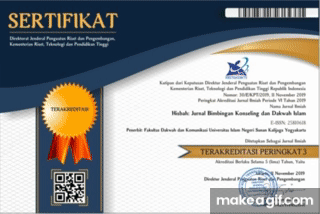PENGEMBANGAN KEPRIBADIAN KONSELOR BERBASIS ASMAUL HUSNA DALAM PELAYANAN KONSELING
DOI:
https://doi.org/10.14421/hisbah.2018.152-07Abstract
This study aims to develop the personality of “asmaul-husna” -based counselor. Counselors who have competence good personality, friendly, and empathetic santun certainly be role models for clients. Personality counselor is supporting the process and results of counseling and assisting clients in exploring, developing, and in facilitating its development. The approach used in this study is the study documentation of the analysis of references and discuss research results and study counselor personality of “asmaul-husna” as a personality basis counselor. Among the values of “asmaul-husna” can be realized in treatment counselor when dealing with clients, namely: has the properties (1) to love, (2) compassionate, (3) rule / leader, (4) has sanctity, (5) giving welfare, ( 6) security provider, (7) custodian, (8) 'manly', (9) 'strong', (10) is able to create / initiative, (11) was able to achieve balance, (12) the opening of grace, (13) clement / forgiving, (14) had committed, (15) the giver of gifts, (16) ar-Razzaq, (17) the opening of grace, (18) has a knowledge / own knowledge, (19) which paved, (20) which glorify, and (22) who listen.
Key words: personalities counselor, ‘asmaul-husna, counseling and counselor profession.
References
Arifin, Samsul, (2013), “Potret Kualitas Kepribadian Konselor Bermartabat Perspektif Konseling At-Tawazun”, dalam Prosiding Kongres XII, Konvensi Nasional XVIII ABKIN dan Seminar Internasional Konseling, Denpasar Bali, 14 s/d 16 November 2013.
Atmoko, Adi, (2014), “Pendidikan Konselor Masa Depan’ dalam Proceeding Profesi Konselor Masa Depan, Semarang, 16 Desember 2014.
Fatmawijaya, Heru Andrian, (2015), “Studi Deskriptif Kompetensi Kepribadian Konselor yang Diharapkan Siswa”, dalam Psikopedagogia, Universitas Ahmad Dahlan, Vol. 4, No.2 ISSN: 2301-6167.
Fuad, Muskinul, (2009), “Kualitas Pribadi Konselor: Urgensi dan Pengembangannya”, KOMUNIKA, Jurusan Dakwah STAIN Purwokerto, Vol.3 No.2 Juli-Desember 2009 pp.247-254.
Gladding, Samuel T., (2012), Konseling: Profesi yang Menyeluruh, edisi keenam, alih bahasa: PM. Winarno dan Lilian Yuwono, Jakarta: PT. Indeks.
Kiswantoro Arista dan Zamroni, Edris, (2015), “Konselor Altruis: Life Model dalam Internalisasi Nilai-Nilai Karakter Peduli Sosial, Tanggung Jawab dan Bersahabat pada Siswa”, Prosiding Seminar Nasional Bimbingan dan Konsleing, PD ABKIN Jawa Timur 8 Pebruari 2015, Adi Buana University Press, ISBN 978-979-8559-38-9 .
Lubis, Namora Lumongga, (2011). Memahami Dasar-Dasar Konseling dalam Teori dan Praktik. Jakarta: Kencana Prenada Media Group).
Mappiare AT, Andi, (2006), Pengantar Konseling dan Psikoterapi, Jakarta: Raja Grafindo Persada.
Mappiare AT, Andi, (2013), “Martabat Konselor Indonesia dalam Falsafah dan Kinerja Model KIPAS: Konseling Intensif Progresif Adaptif Struktur”, dalam Prosiding Kongres XII, Konvensi Nasional XVIII ABKIN dan Seminar Internasional Konseling, Denpasar Bali, 14 – 16 November 2013.
Mas’udi, (2014), “Kedudukan Penyuluhan dan Konselor dalam Konseling Islam”, dalam KONSELING RELIGI: Jurnal Bimbingan Konseling Islam, Vol. 5, No. 2, Desember 2014.
Mas’udi, (2015), “Membangun Moral Profetik Mencetak Konselor Idaman”, dalam KONSELING RELIGI: Jurnal Bimbingan Konseling Islam, Vol. 6, No. 2, Desember 2015.
MD. Dahlan, (2005), “Mengembangkan Fitrah Manusia dalam Upaya Meraih Nur Ilahiyah (Aplikasi Asmaul Husna dalam Membeningkan Kalbu Melalui Konseling)”, dalam Panduan Seminar Nasional Bimbingan dan Konseling dalam Rangka Purnabakti Prof. Dr. H. Moh. Djawad Dahlan, diselenggarakan Atas Kerjasama Fakultas Ilmu Pendidikan dengan Program Pascasarjana Universitas Pendidikan Indonesia, Bandung, 21 Marey 2005.
Murad, Abdul, (2011), “Tingkat Kinerja Konselor Profesional”, Jurnal Ilmu Pendidikan, Jilid 17, Nomor 5, Juni 2011.
Nirwana, Herman, (2014), “Peningkatan Keprofesionalan Konselor Sekolah di Lapangan”, dalam Proceeding Guidance and Counseling International Seminar and Workshop, Padang June 5 to 6,2014.
Permendiknas No. 27 tahun 2008 tentang Standar Kualifikasi Akademik dan Kompetensi Konselor.
Rasmani, Upik Elok Endang, (2014), “Pelatihan Soft Skill Menuju Konselor Masa Depan”, dalam Proceeding Profesi Konselor Masa Depan, Semarang, 16 Desember 2014.
Rosyid, Moh., (2013), “Karakteristik Konselor bagi Mahasiswa (Program Studi Langka Peminat)”, dalam KONSELING RELIGI: Jurnal Bimbingan Konseling Islam,Vol. 4, No. 2, Desember 2013.
Setiawati, Farida Agus, dkk, (2015), “Implementasi MMBT untuk Pengembangan Karir Mahasiswa: Studi Perbedaan Tipe Kepribadian pada Mahasiswa Bimbingan Konseling”, dalam Jurnal Penelitian Ilmu Pendidikan, Volume 8, Nomor 2, September 2015.
Stiyowati, S, dkk, (2013), “Hubungan antara Persepsi Siswa terhadap Pribadi Konselor dan Fasilitas BK dengan Minat Siswa untuk Memanfaatkan Layanan Konseling di Sekolah”, dalam Jurnal BK UNESA. Volume 03 Nomor 01 Tahun 2013.
Undang-Undang Nomor 20 tahun 2003 tentang Sistem Pendidikan Nasional.
Warsito, Hadi dan Junaedi, (2013), “Hubungan Antara Persepsi Siswa terhadap Kompetensi Kepribadian dan Kinerja Konselor dengan Minat Siswa untuk Memanfaatkan Layanan Bimbingan dan Konseling di Sekolah”, Journal Mahasiswa Bimbingan Konseling, Volume 01 Nomor 01 Tahun 2013.
Wibowo, Mungin Eddy, (2014), “Konselor Masa Depan (The Future Counselor)”, dalam Proceeding Profesi Konselor Masa Depan, Semarang, 16 Desember 2014.
Winarko, Shodiq A., (2014), Dzikir-Dzikir Peredam Stres, Jakarta: Mutiara Allaman Utama.
Downloads
Published
Issue
Section
License
Authors who publish with this journal agree to the following terms:
- Authors retain copyright and grant the journal right of first publication with the work simultaneously licensed under a Creative Commons Attribution License that allows others to share the work with an acknowledgement of the work's authorship and initial publication in this journal.
- Authors are able to enter into separate, additional contractual arrangements for the non-exclusive distribution of the journal's published version of the work (e.g., post it to an institutional repository or publish it in a book), with an acknowledgement of its initial publication in this journal.
- Authors are permitted and encouraged to post their work online (e.g., in institutional repositories or on their website) prior to and during the submission process, as it can lead to productive exchanges, as well as earlier and greater citation of published work.











